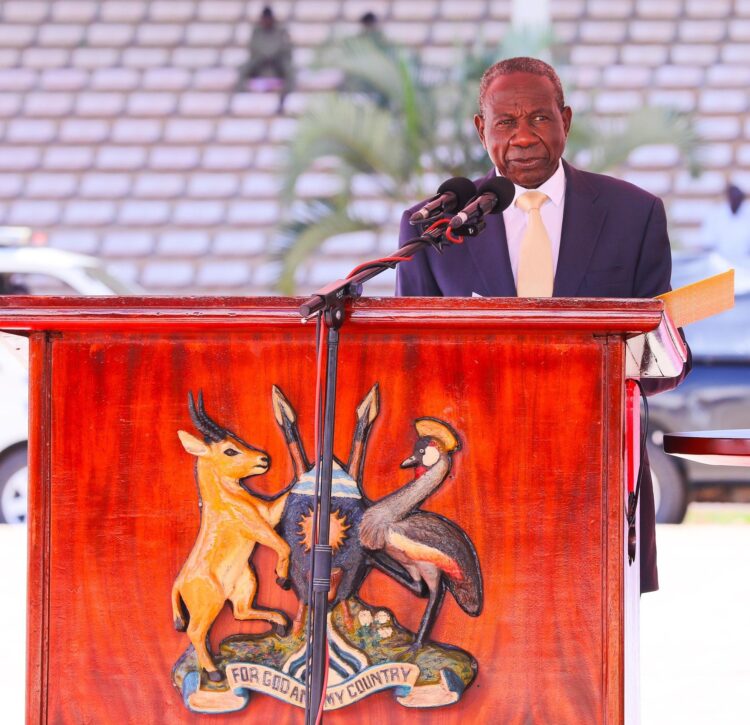The education sector has been allocated Shs 5.04 trillion in the 2025/2026 national budget to expand access, improve infrastructure, and raise the quality of teaching and learning in the country.
While presenting the National Budget at Kololo Independence Grounds today, Finance Minister Matia Kasaija said the funding would deepen the gains achieved in the just-ended financial year and lay the groundwork for a more skilled, competitive, and inclusive society.
“Madam Speaker, Government remains committed to ensuring that every Ugandan child accesses quality education at all levels,” Mr Kasaija said. “That is why we are continuing to invest heavily in school infrastructure, teacher training, curriculum reform, and student financing.”
The minister reported that during the 2024/25 financial year, access to Universal Primary Education (UPE) was provided to 9.52 million learners, while 995,116 students benefited under Universal Secondary Education (USE) and Universal Post O’Level Education and Training.
“To support higher learning, we financed 5,192 students through the Higher Education Students’ Loan Scheme, while an additional 4,000 learners secured government sponsorships at public universities,” he noted.
Mr Kasaija said government had also constructed 166 seed secondary schools under the Uganda Intergovernmental Fiscal Transfers (UgIFT) program.
In a bid to prepare for the upcoming African Nations Championship (CHAN) and AFCON 2027, Shs 496.8 billion was spent on the construction of Hoima and Akii Bua stadia and training facilities across the country.
“Mandela National Stadium has been upgraded and the High-Altitude Training Centre in Teryet, Kapchorwa, was commissioned,” he added.
In a push to raise teaching standards, government has launched the Uganda National Institute for Teacher Education (UNITE), enrolling 1,000 students across five campuses. “UNITE will take over 23 primary teachers’ colleges to upgrade certificate-level teachers to diploma and eventually degree level,” Mr Kasaija clarified.
To strengthen inspection and ensure compliance with quality standards, government digitalized school supervision in all public schools and Technical Vocational Education and Training (TVET) institutions. Additionally, the new A-Level Competence-Based Curriculum has been rolled out, and the first batch of 357,120 learners have transitioned into it.
“We also implemented the TVET reform to increase industry participation in training. A new TVET Council and Sector Skills Councils have been established to ensure relevance,” the minister said.
Looking to the next financial year, Mr Kasaija outlined key interventions under the Shs 5.04 trillion education budget. These include the continued provision of free UPE and USE, expansion and construction of seed secondary schools, and rehabilitation of 120 traditional secondary and 31 special needs primary schools.
Other priorities are the recruitment of more teachers and non-teaching staff, rollout of electronic inspection systems, improvement of textbook-to-student ratios from 1:15 to 1:3, and the operationalisation of Bunyoro and Busoga universities.
“We are also finalising the construction of key stadiums and training facilities ahead of CHAN and AFCON27 to not only support sports development but to inspire youth participation and patriotism,” Mr Kasaija said.
Stakeholders in the education sector have welcomed the funding but called for efficient implementation and regular monitoring to ensure that the planned investments translate into tangible results for learners.
“The government has done its part with the allocation,” said Ms Florence Nabunya, a head teacher in Wakiso. “Now it’s about ensuring that funds reach schools in time and are used to improve learning conditions.”
Educationists also lauded the renewed focus on teacher qualification. “Upgrading our teachers to diploma and degree levels is key if we are to improve learning outcomes. We must attract, train and retain quality educators,” said Dr Peter Mugisha, a lecturer at Kyambogo University.
With the country’s population growing rapidly, the need for accessible and quality education is more urgent than ever. Mr Kasaija stressed that education remains central to the government’s economic strategy.
“This is not just spending—it’s investment in the future of our country,” he said. “A skilled and educated population is the foundation for innovation, job creation, and inclusive growth. We are committed to making that future a reality.”
As Uganda moves into the final stretch of Vision 2040, the education sector appears set to play a central role in unlocking the potential of its youthful population.





















Discussion about this post